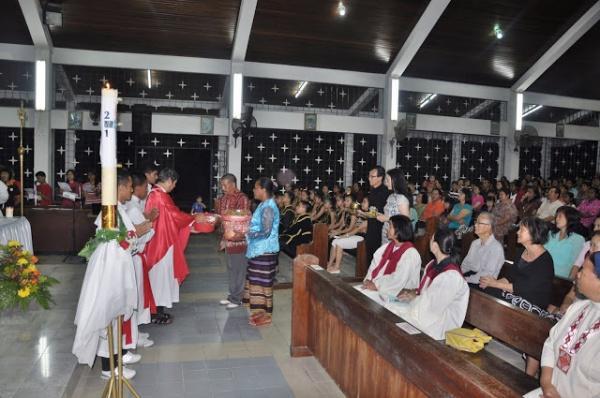Cassandra Chung takes a look at the ‘Allah’ ban controversy and remembers a better time for Malaysia.
I’m sure we all remember bits and pieces of our childhood. I certainly do. I lost count of the number of times I fell down on the tarred road of our assembly venue from playing ‘ice and fire’. During assembly, we all sang Negaraku and the state anthem at the top of our voices. Every time Independence Day was near, we would be waving our mini flags while singing the famous Tanggal 31, Keranamu Malaysia and Jalur Gemilang at the special assembly held in school. There were also times when a big group of us would get in trouble for not doing work. We would all proceed to smother our hands with glue because apparently, when the teacher canes you, it would be less painful.
Back at home, I would usually spend my time watching television, doing homework or cycling around my housing area. Sometimes my sister and I would use the road as our badminton court together with our neighbours, in the event that we were too lazy to walk to the nearby park where there was a proper court. If we did walk to the park, our badminton games would usually be followed by a game of what we call ‘Crocodile’ on the slides. On other occasions, we would just sit on the swings.
Then, everything changed.
My friends were no longer labelled as either ‘boys’ or ‘girls’. There were extra labels now: my friends were Malay, Chinese, Indian or Lain-lain. Maybe it was because I started noticing that the Student Information Forms the school was always giving out kept asking for my race. As I progressed into secondary school, the loud singing of our national anthem seemed to get softer until I couldn’t hear anything. It was the same for any other nationalistic song sang during Independence celebrations at school.
I guess we all started noticing that Malaysia was not the fine and dandy country we once believed it to be. I started realising that my mother was getting more paranoid when it came to letting my sister and I go out. Perhaps it was because of the slashing and snatch theft incident that happened just right beside my house. It did not help that the police were powerless to stop rising crime. It was not long before a guard house was built at one of the entrances of my housing area (the other entrance was blocked).
Thankfully, my transition from primary to secondary was not all that bad. I began to see the world in a different perspective. I became a Christian in my secondary school years. While the medium of instruction in my church and my Christian Fellowships is English, we occasionally would sing in Malay. My youth group once dedicated a whole service to teaching us the Malay translation of Biblical terms. If I remember correctly, they stressed the importance of learning the Malay translation of Biblical terms because a large part of Christian community in Sabah and Sarawak worshipped in that language. I’ve listened to sermons in Malay in Christian Fellowship, as well. There was a time I could sing the Indonesian gospel song ‘Kau Yang Terindah’ without fear.
That was before the Allah controversy reared its ugly head. Arson attacks focused on churches do not bode well with someone who goes to a very big church. After all, in theory, the bigger churches would have more resources to convert Muslims, right? Going by that logic, my church was a strong candidate for a target. Thankfully, my church was untouched, though it broke the hearts of many of my church members to see our fellow brothers and sisters in Christ have their churches desecrated. When the arson attacks finally stopped, everybody thought everything was back to normal. Sadly, the recent judgement by the Court of Appeal proved us wrong.
The ruling might only apply to The Herald but what makes you think certain quarters are not going to push it further? Why just The Herald? Why not every single church newsletter or newspaper published, whether in the Peninsular or in East Malaysia? In fact, what makes you think it will stop at newsletters and newspapers? They might start regulating what we sing in church. That sounds ludicrous, I know, but ask yourself, is it really impossible? Next thing you know, they might ban church gatherings — or any other religious gatherings, for that matter — on the pretext that it confuses Muslims.
There was a time I actually felt I was a part of Malaysia.
That was before certain quarters started telling ‘my kind’ to go back from ‘where I came from’ or emigrate if I was unhappy here. As I write this now, there are calls for the Malaysian Christians to just deal with the court ruling. If we are unhappy, we can leave Malaysia. They speak as if the involved parties should not even be thinking of appealing the decision, as if the involved parties have no right to appeal. With so many calls to leave Malaysia permanently, the logical thing certain parties should do is this: Leave rather than deal with all this continuing nonsense. After all, 300,000 Malaysians have done so in the past decade.
I personally think I could never do that, but I fear the arrival of ‘the day’. The day when my future child — or anybody, for that matter — will ask me:
“Why did you leave Malaysia?”
And I will have no choice but to say:
“I didn’t want to. I was banished because I was unhappy with the way things were.”
It has been becoming more of a possibility as each day passes.
Featured image sourced from Diocese of Sandakan blog


i REALLY ENJOYED READING YOUR COLUMN.
HAMID
Nice!